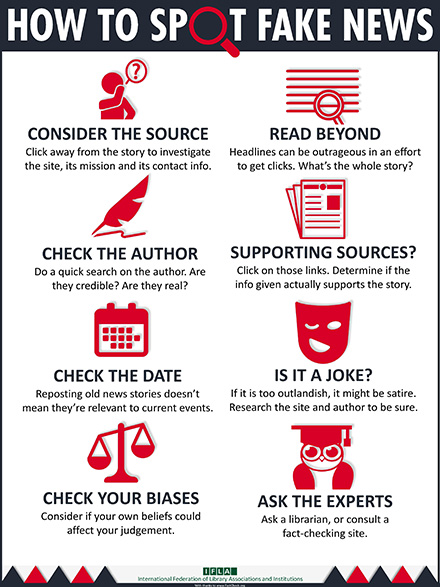Evaluating information resources (the CRAAP Test)
McMaster Libraries. (2015, January 23). How Library Stuff Works: How to Evaluate Resources (the CRAAP Test) [Video]. YouTube. https://youtu.be/_M1-aMCJHFg
How do you spot fake news

How to Spot Fake News
- Consider the Source - Click away from the story to investigate the site, its mission and its contact info.
- Read Beyond - Headlines can be outrageous in an effort to get clicks. What's the whole story?
- Check the Author - Do a quick search on the author. Are they credible? Are they real?
- Supporting Sources? - Click on those links. Determine if the info given actually supports the story.
- Check the Date - Reposting old news stories doesn't mean they're relevant to current events.
- Is it a Joke? - If it is too outlandish, it might be satire. Research the site and author to be sure.
- Check your Biases - Consider if your own beliefs could affect your judgment.
- Ask the Experts - Ask a librarian or consult a fact-checking site.
International Federation of Library Associations and Institutions (IFLA). (2020, July 10). How to spot fake news [Infographic]. IFLA. https://www.ifla.org/publications/node/11174
- IFLA - How to spot fake newsThe International Federation of Library Associations and Institutions webpage.
Web Literacy for Student Fact-Checkers [e-book]
- Web Literacy for Student Fact-Checkers byA practical guide for fact-checkers. Shows how to use date filters to find the source of viral content, how to assess the reputation of a scientific journal, how to see if a tweet is really from the famous person you think it is or from an impostor. and much more.
This book is licensed under a Creative Commons Attribution 4.0 International License.
